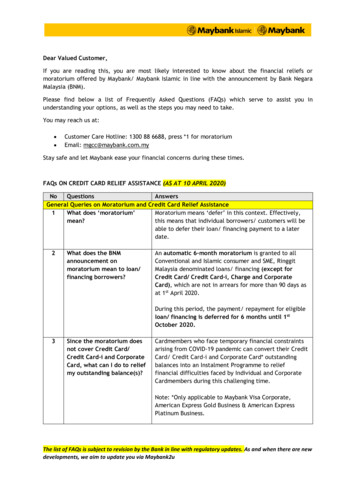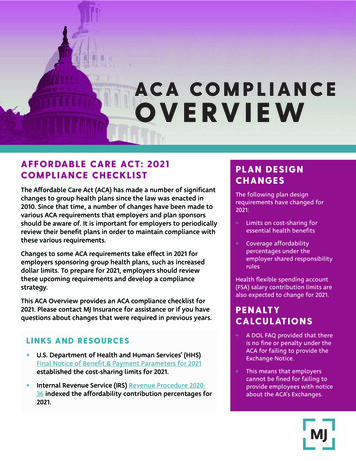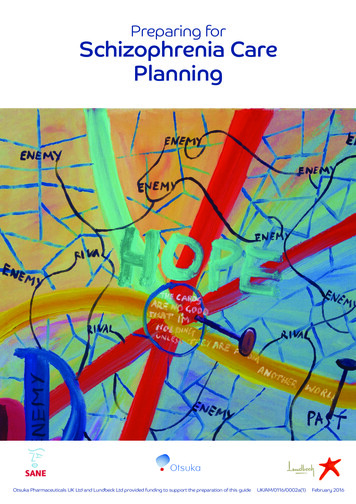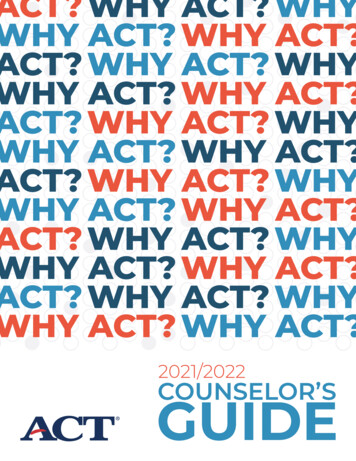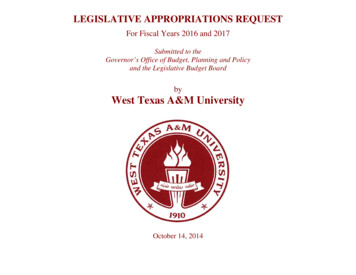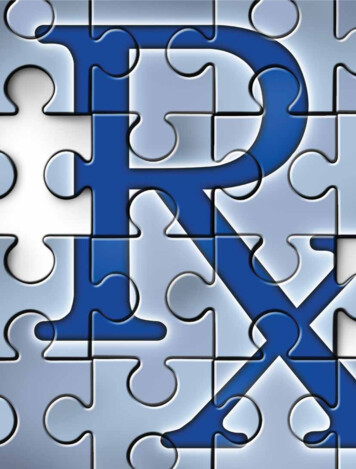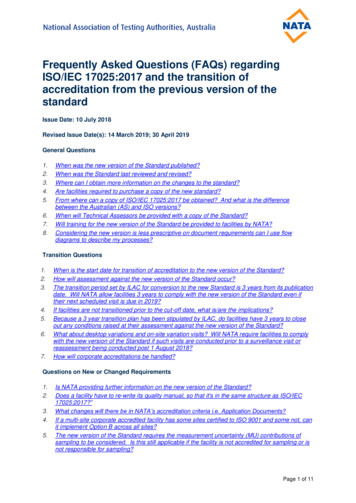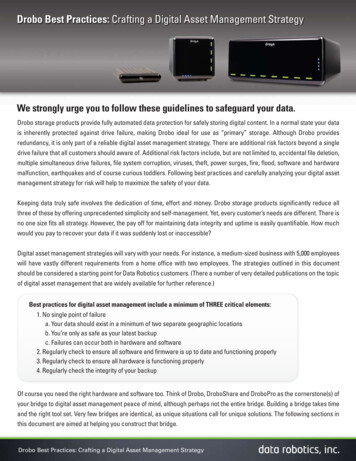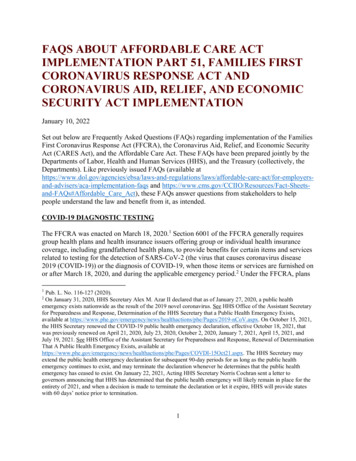
Transcription
FAQS ABOUT AFFORDABLE CARE ACTIMPLEMENTATION PART 51, FAMILIES FIRSTCORONAVIRUS RESPONSE ACT ANDCORONAVIRUS AID, RELIEF, AND ECONOMICSECURITY ACT IMPLEMENTATIONJanuary 10, 2022Set out below are Frequently Asked Questions (FAQs) regarding implementation of the FamiliesFirst Coronavirus Response Act (FFCRA), the Coronavirus Aid, Relief, and Economic SecurityAct (CARES Act), and the Affordable Care Act. These FAQs have been prepared jointly by theDepartments of Labor, Health and Human Services (HHS), and the Treasury (collectively, theDepartments). Like previously issued FAQs (available dvisers/aca-implementation-faqs and -FAQs#Affordable Care Act), these FAQs answer questions from stakeholders to helppeople understand the law and benefit from it, as intended.COVID-19 DIAGNOSTIC TESTINGThe FFCRA was enacted on March 18, 2020.1 Section 6001 of the FFCRA generally requiresgroup health plans and health insurance issuers offering group or individual health insurancecoverage, including grandfathered health plans, to provide benefits for certain items and servicesrelated to testing for the detection of SARS-CoV-2 (the virus that causes coronavirus disease2019 (COVID-19)) or the diagnosis of COVID-19, when those items or services are furnished onor after March 18, 2020, and during the applicable emergency period.2 Under the FFCRA, plans1Pub. L. No. 116-127 (2020).On January 31, 2020, HHS Secretary Alex M. Azar II declared that as of January 27, 2020, a public healthemergency exists nationwide as the result of the 2019 novel coronavirus. See HHS Office of the Assistant Secretaryfor Preparedness and Response, Determination of the HHS Secretary that a Public Health Emergency Exists,available at he/Pages/2019-nCoV.aspx. On October 15, 2021,the HHS Secretary renewed the COVID-19 public health emergency declaration, effective October 18, 2021, thatwas previously renewed on April 21, 2020, July 23, 2020, October 2, 2020, January 7, 2021, April 15, 2021, andJuly 19, 2021. See HHS Office of the Assistant Secretary for Preparedness and Response, Renewal of DeterminationThat A Public Health Emergency Exists, available /phe/Pages/COVDI-15Oct21.aspx. The HHS Secretary mayextend the public health emergency declaration for subsequent 90-day periods for as long as the public healthemergency continues to exist, and may terminate the declaration whenever he determines that the public healthemergency has ceased to exist. On January 22, 2021, Acting HHS Secretary Norris Cochran sent a letter togovernors announcing that HHS has determined that the public health emergency will likely remain in place for theentirety of 2021, and when a decision is made to terminate the declaration or let it expire, HHS will provide stateswith 60 days’ notice prior to termination.21
and issuers must provide this coverage without imposing any cost-sharing requirements(including deductibles, copayments, and coinsurance), prior authorization, or other medicalmanagement requirements.The CARES Act was enacted on March 27, 2020.3 Section 3201 of the CARES Act amendedsection 6001 of the FFCRA to include a broader range of diagnostic items and services that plansand issuers must cover without any cost-sharing requirements, prior authorization, or othermedical management requirements.4 Section 3202(a) of the CARES Act requires plans andissuers providing coverage to reimburse a provider that has a negotiated rate with the plan orissuer for COVID-19 diagnostic testing an amount that equals that negotiated rate; or, if the planor issuer does not have a negotiated rate with such provider, the cash price for such service thatis listed by the provider on a public website. (The plan or issuer may negotiate a rate with theprovider that is lower than the cash price.) Additionally, during the public health emergencyrelated to COVID-19 declared under section 319 of the Public Health Service Act (PHS Act),section 3202(b) of the CARES Act and implementing regulations at 45 CFR Part 182 requireproviders of diagnostic tests for COVID-19 to make public the cash price of a COVID-19diagnostic test on the provider’s public internet website or face potential enforcement actionincluding civil monetary penalties.Under section 6001(c) of the FFCRA, the Departments are authorized to implement therequirements of section 6001 of the FFCRA through sub-regulatory guidance, programinstruction, or otherwise. The Departments have previously issued four sets of FAQs toimplement provisions of the FFCRA and CARES Act and to address other health coverage issuesrelated to COVID-19.5 Due to the urgent need to continue to facilitate the nation’s response tothe public health emergency posed by COVID-19, the Departments believe that this guidance isa statement of policy not subject to the notice and comment requirements of the AdministrativeProcedure Act (APA).6 For the same reasons, the Departments additionally find that, even if thisguidance were subject to the public participation provisions of the APA, prior notice and3Pub. L. No. 116-136 (2020).For purposes of this document, references to section 6001 of the FFCRA include the amendments made by section3201 of the CARES Act, unless otherwise specified.5See FAQs about Families First Coronavirus Response Act and Coronavirus Aid, Relief, and Economic SecurityAct Implementation Part 42 (Apr. 11, 2020), available at 2.pdf and Qs.pdf (FAQs Part 42); FAQs about Families First Coronavirus Response Act and Coronavirus Aid, Relief, andEconomic Security Act Implementation Part 43 (June 23, 2020), available t-43.pdf 3-FAQs.pdf (FAQs Part 43); FAQs about Families FirstCoronavirus Response Act and Coronavirus Aid, Relief, and Economic Security Act Implementation Part 44 (Feb.26, 2021), available at 4.pdf and f (FAQs Part 44); and FAQsabout Affordable Care Act Implementation Part 50, Health Insurance Portability and Accountability Act andCoronavirus Aid, Relief, and Economic Security Act Implementation (Oct. 4, 2021), available t-50.pdf -and-FAQs/Downloads/FAQs-Part-50.pdf (FAQs Part 50).65 U.S.C. § 553(b)(A).42
comment for this guidance is impracticable and/or contrary to the public interest, and there isgood cause to issue this guidance without prior public comment and without a delayed effectivedate.7In June 2020, the Departments issued FAQs Part 43. In FAQs Part 43, Q4, the Departmentsstated that plans and issuers are required under section 6001 of the FFCRA to cover COVID-19tests intended for at-home testing, when the test is ordered by an attending health care providerwho has determined that the test is medically appropriate for the individual based on currentaccepted standards of medical practice and the test otherwise meets the statutory criteria underthe FFCRA.8In issuing FAQs Part 43, the Departments noted that, as of the date of publication of thatdocument, the Food and Drug Administration (FDA) had not yet authorized any COVID-19diagnostic tests to be completely used and processed at home.9 However, since June 2020, whenFAQs Part 43 were issued, the FDA has authorized additional diagnostic tests for COVID-19,including tests that can be self-administered and self-read at home or elsewhere without theinvolvement of a health care provider, sometimes referred to as self-tests or at-home tests.10These at-home diagnostic tests are now available either by prescription or over-the-counter(OTC) (without either a prescription or individualized clinical assessment by a health careprovider), through pharmacies, retail stores, and online retailers.On December 2, 2021, President Biden announced that the Departments would issue guidance byJanuary 15, 2022, to clarify that individuals who purchase OTC COVID-19 diagnostic tests(referred to as OTC COVID-19 tests throughout this document) during the public healthemergency will be able to seek reimbursement from their plan or issuer. 11 These FAQs providethat guidance. The Departments have evaluated the requirements of section 6001 of the FFCRAand the implementing guidance issued to date and have determined that it is appropriate to issuethese FAQs. Testing is critically important to help reduce the spread of SARS-CoV-2, as well asto quickly diagnose SARS-CoV-2 infection and COVID-19 so that it can be effectively treated.5 U.S.C. § 553(b)(B) and (d)(3). Good cause exists for the same reasons underlying the issuance of the March 13,2020 Proclamation on Declaring a National Emergency Concerning the Coronavirus Disease 2019 (COVID-19)Outbreak and the determination, under section 501(b) of the Robert T. Stafford Disaster Relief and EmergencyAssistance Act, 42 U.S.C. § 5121 et seq., that a national emergency exists nationwide as a result of the COVID-19pandemic, and the same reasons underlying the issuance of the January 31, 2020 declaration that a public healthemergency exists, under section 319 of the PHS Act.8See 43.pdf 3-FAQs.pdf.9Id. at footnote 8.10The FDA provides information on which at-home tests are authorized for use at dical-devices/in-vitro-diagnosticseuas.11President Biden Announces New Actions to Protect Americans Against the Delta and Omicron Variants as WeBattle COVID- 19 this Winter (Dec. 2, 2021), available at -this-winter/.73
In light of FDA authorization of at-home tests available OTC, to remove financial barriers andexpand access to COVID-19 testing, and to ensure consistency with section 6001 of the FFCRA,the Departments are issuing this guidance to clarify that individuals who purchase OTC COVID19 tests during the public health emergency will be able to seek reimbursement from their plan orissuer. The Departments are updating their guidance to generally require coverage of OTCCOVID-19 tests under section 6001 of the FFCRA, with or without an order or individualizedclinical assessment by an attending health care provider, as described below.Q1: Under section 6001 of the FFCRA, are plans and issuers required to cover OTCCOVID-19 tests available without an order or individualized clinical assessment by ahealth care provider?Yes. Plans and issuers must cover OTC COVID-19 tests that meet the statutory criteria undersection 6001(a)(1) of the FFCRA,12 including tests obtained without the involvement of a healthcare provider. Consistent with section 6001 of the FFCRA, this coverage must be providedwithout imposing any cost-sharing requirements, prior authorization, or other medicalmanagement requirements. In this context, with respect to OTC COVID-19 tests obtainedwithout a health care provider’s involvement, the Departments interpret the relevant FFCRA andCARES Act provisions to require coverage without out-of-pocket expense to the participant,beneficiary, or enrollee for the cost of the test (unless a plan or issuer meets the conditions forthe safe harbors described in Q2 and Q3).Section 6001 of the FFCRA does not require a plan or issuer to provide coverage by reimbursingsellers of OTC COVID-19 tests directly (also referred to in this document as “direct coverage”);a plan or issuer may instead require a participant, beneficiary, or enrollee who purchases an OTCCOVID-19 test to submit a claim for reimbursement to the plan or issuer (in accordance with theplan’s or issuer’s reasonable internal claims procedures, consistent with applicable federal andstate law). However, plans and issuers are strongly encouraged to provide direct coverage forOTC COVID-19 tests to participants, beneficiaries, and enrollees by reimbursing sellers directlywithout requiring participants, beneficiaries, or enrollees to provide upfront payment and seekreimbursement.This FAQ modifies guidance previously provided by the Departments13 such that therequirement to cover COVID-19 tests under section 6001 of the FFCRA with respect to OTCSection 6001(a)(1) of the FFCRA, as amended by section 3201 of the CARES Act, describes in vitro diagnostictests for the detection of SARS-CoV-2 or the diagnosis of COVID-19 that (A) are approved, cleared, or authorizedunder section 510(k), 513, 515, or 564 of the Federal Food, Drug, and Cosmetic Act; (B) the developer hasrequested, or intends to request, emergency use authorization under section 564 of the Federal Food, Drug, andCosmetic Act, unless and until the emergency use authorization request under such section 564 has been denied orthe developer of such test does not submit a request under such section within a reasonable timeframe; (C) aredeveloped in and authorized by a state that has notified the Secretary of HHS of its intention to review tests intendedto diagnose COVID–19; or (D) are other tests that the Secretary of HHS determines appropriate in guidance.13FAQs Part 43, Q4 is superseded. FAQs Part 42, Q6 and FAQs Part 43, Q3 and Q6 continue to apply with respectto tests that require the order of a health care provider under the applicable FDA authorization or approval, but are124
COVID-19 tests is no longer limited only to situations in which the individual has an order orindividualized clinical assessment from a health care provider. This updated guidance requirescoverage, without an order or individualized clinical assessment from a health care provider,only with respect to OTC COVID-19 tests that do not require a health care provider’s orderunder the applicable FDA authorization, clearance, or approval. This FAQ does not modifyprevious guidance14 addressing coverage for purposes not primarily intended for individualizeddiagnosis or treatment of COVID-19, including the guidance that states that plans and issuers arenot required to provide coverage of testing (including an OTC COVID-19 test) that is foremployment purposes.Q2: If a plan or issuer provides direct coverage of OTC COVID-19 tests, may it limitcoverage to only tests that are provided through preferred pharmacies or other retailers?No. However, a plan or issuer may limit reimbursement for OTC COVID-19 tests in a mannerthat meets the conditions of the safe harbor described in this Q2. A reimbursement structure thatremoves barriers associated with upfront costs will facilitate access to COVID-19 tests and,therefore, also improve health equity. At the same time, the Departments are of the view that it isimportant to ensure that participants, beneficiaries, and enrollees can receive reasonablereimbursement for OTC COVID-19 tests purchased from pharmacies or other retailers of theirchoice.Therefore, the Departments will not take enforcement action related to coverage of OTCCOVID-19 tests against any plan or issuer that provides coverage of OTC COVID-19 testspurchased by participants, beneficiaries, and enrollees during the public health emergency byarranging for direct coverage of OTC COVID-19 tests that meet the statutory criteria undersection 6001(a)(1) of the FFCRA through both its pharmacy network and a direct-to-consumershipping program, and otherwise limits reimbursement for OTC COVID-19 tests from nonpreferred pharmacies or other retailers to no less than the actual price, or 12 per test (whicheveris lower).15 Plans and issuers may elect to provide more generous reimbursement up to theactual price of the test. Additionally, under this safe harbor, the direct-to-consumer shippingprogram may be provided through one or more in-network provider(s) or another entitydesignated by the plan or issuer.For purposes of this safe harbor, direct coverage of OTC COVID-19 tests means that aparticipant, beneficiary, or enrollee is not required to seek reimbursement post-purchase; instead,the plan or issuer must make the systems and technology changes necessary to process the plan’sor issuer’s payment to the preferred pharmacy or retailer directly (including the direct-tosuperseded to the extent inconsistent with this guidance with respect to OTC COVID-19 tests or other tests that donot require a health care provider’s order.14See FAQs Part 44, Q2, available at 4.pdf and f.15The Departments recognize that some OTC COVID-19 tests are sold in packages containing more than one test.If a plan or issuer limits reimbursement for OTC COVID-19 tests from non-preferred sellers, pharmacies, orretailers to 12 per test, as allowed under Q2, the plan or issuer must calculate the reimbursement based on thenumber of tests in a package.5
consumer shipping program) with no upfront out-of-pocket expenditure by the participant,beneficiary, or enrollee. Under this safe harbor (and consistent with the general requirement asstated in Q1), plans or issuers may not impose any prior authorization or other medicalmanagement requirements on participants, beneficiaries, or enrollees that obtain applicable OTCCOVID-19 tests via such a direct coverage program, or otherwise. In providing OTC COVID-19tests through its direct coverage program, a plan or issuer must take reasonable steps to ensurethat participants, beneficiaries, and enrollees have adequate access to OTC COVID-19 tests,through an adequate number of retail locations (including both in-person and online locations).The Departments note that whether there is adequate access should be determined based on allrelevant facts and circumstances, such as the locality of participants, beneficiaries, and enrolleesunder the plan or coverage and current utilization of the plan’s or issuer’s pharmacy network byits participants, beneficiaries, and enrollees. Furthermore, in implementing this safe harbor, plansand issuers should keep in mind the general purpose of the safe harbor – which is to facilitateconsumer access and provide for a seamless experience in obtaining free OTC COVID-19 tests.Accordingly, plans and issuers should ensure that participants, beneficiaries, and enrollees areaware of key information needed to access OTC COVID-19 testing, such as dates of availabilityof the direct coverage program and participating retailers or other locations.The Departments note that, if a plan or issuer is relying on this safe harbor to meet its obligationto cover OTC COVID-19 tests, but is at any time unable to meet the requirements of this safeharbor (for example, if there are delays that are significantly longer than the amount of time ittakes to receive other items under the plan’s or issuer’s direct-to-consumer shipping program),the plan or issuer would be required to provide coverage for OTC COVID-19 tests in a mannerthat is otherwise consistent with the requirements described in this guidance. Specifically, a planor issuer that is unable to meet the requirements of this safe harbor could not deny coverage orimpose cost sharing (including setting limits on the amount of reimbursement for OTC COVID19 tests) with respect to any OTC COVID-19 tests, obtained by participants, beneficiaries, orenrollees, that meet the statutory criteria under section 6001(a)(1) of the FFCRA during thisperiod, including those purchased from non-preferred sellers. Furthermore, this safe harborapplies only with respect to the requirement to provide coverage of OTC COVID-19 tests thatare administered without a provider’s involvement or prescription; plans and issuers mustcontinue to provide coverage for COVID-19 tests that are administered with a provider’sinvolvement or prescription, as required by section 6001 of the FFCRA and the Departments’guidance, even when relying on this safe harbor. HHS encourages states to take an approachsimilar to this safe harbor and will not consider a state to have failed to substantially enforcesection 6001 of the FFCRA if it takes such an approach.Q3: If a plan or issuer otherwise provides coverage without cost sharing for COVID-19diagnostic tests, may a plan or issuer set limits on the number or frequency of OTCCOVID-19 tests covered without cost sharing under a plan or coverage?Yes, but only if the plan or issuer meets the conditions for the safe harbor described in this Q3.The Departments are of the view that it is important to allow plans and issuers to implementcertain safeguards against problematic behaviors and ensure OTC COVID-19 tests are accessible6
to everyone who needs them, when they need them. Furthermore, the Departments recognize anindividualized clinical assessment or a health care provider’s involvement in the administrationof a COVID-19 test may play a role in ensuring the appropriateness and proper utilization ofCOVID-19 testing for diagnostic purposes and are of the view that additional safeguards arewarranted for OTC COVID-19 tests that are covered without such an assessment or provider’sinvolvement.Therefore, with respect to OTC COVID-19 tests purchased by participants, beneficiaries, andenrollees during the public health emergency that are available without such an assessment orprovider’s involvement, the Departments will not take enforcement action against any plan orissuer that, during the public health emergency, provides coverage without cost sharing for (anddoes not impose prior authorization or other medical management requirements on) such OTCCOVID-19 tests, if the plan or issuer limits the number of OTC COVID-19 tests covered foreach participant, beneficiary, or enrollee to no less than 8 tests16 per 30-day period (or percalendar month).Although the Departments are adopting this safe harbor, in part, to discourage behaviors thatcould lead to future shortages, the Departments recognize that individuals may reasonablypurchase more OTC COVID-19 tests in a single day than they would use that day or week. TheDepartments also recognize that multiple individuals covered as a family or household under thesame plan or coverage may need to be tested in a short period of time (for example, during aquarantine period following exposure) and that individuals within a family may also experiencemultiple needs for diagnostic testing in short periods of time. For these reasons, under this safeharbor, a plan or issuer would be required to set the limit for at least 8 individual tests per 30-dayperiod (or per calendar month) per participant, beneficiary, or enrollee, but must not limitparticipants, beneficiaries, or enrollees to a smaller number of these tests over a shorter period(for example, limiting individuals to 4 tests per 15-day period), though plans and issuers may setmore generous limits.The Departments note that this safe harbor applies only with respect to the coverage of OTCCOVID-19 tests that are administered without a provider’s involvement or prescription; plansand issuers must continue to provide coverage for COVID-19 tests that are administered with aprovider’s involvement or prescription, as required by section 6001 of the FFCRA and theDepartments’ guidance, even when relying on this safe harbor. HHS encourages states to take anapproach similar to this safe harbor and will not consider a state to have failed to substantiallyenforce section 6001 of the FFCRA if it takes such an approach.The Departments recognize that some OTC COVID-19 tests are sold in packages containing more than one test.In applying the quantity limit of 8, plans and issuers may count each test separately, even if multiple tests are sold inone package.167
Q4: When providing coverage of OTC COVID-19 tests, are plans and issuers permitted toaddress suspected fraud and abuse?Yes. As stated in FAQs Part 44, Q2, although the FFCRA prohibits medical management ofcoverage of COVID-19 diagnostic testing, plans and issuers may act to prevent, detect, andaddress fraud and abuse. Examples of permissible activities include the following: A plan or issuer may take reasonable steps to ensure that an OTC COVID-19 test forwhich a covered individual seeks coverage under the plan or coverage was purchased forthe individual’s own personal use (or use by another participant, beneficiary, or enrolleewho is covered under the plan or coverage as a member of the individual’s family),provided that such steps do not create significant barriers for participants, beneficiaries,and enrollees to obtain these tests. For example, a plan or issuer could require anattestation, such as a signature on a brief attestation document, that the OTC COVID-19test was purchased by the participant, beneficiary, or enrollee for personal use, not foremployment purposes, has not been (and will not be) reimbursed by another source, andis not for resale. In contrast, the Departments are of the view that fraud and abuseprograms that require an individual to submit multiple documents or involve numeroussteps that unduly delay a participant’s, beneficiary’s, or enrollee’s access to, orreimbursement for, OTC COVID-19 tests are not reasonable. A plan or issuer may require reasonable documentation of proof of purchase with a claimfor reimbursement for the cost of an OTC COVID-19 test. Examples of suchdocumentation could include the UPC code for the OTC COVID-19 test to verify that theitem is one for which coverage is required under section 6001 of FFCRA, and/or a receiptfrom the seller of the test, documenting the date of purchase and the price of the OTCCOVID-19 test.Q5: How can plans and issuers facilitate access to, effective use of, and prompt payment forOTC COVID-19 tests?The Departments recognize that participants, beneficiaries, and enrollees may benefit fromeducation, as well as other forms of consumer support, in order to access and use OTC COVID19 tests as intended. Plans and issuers may provide education and information resources tosupport consumers seeking OTC COVID-19 testing, as long as such resources make clear thatthe plan or issuer provides coverage for, including reimbursement of, all OTC COVID-19 teststhat meet the statutory criteria under section 6001(a)(1) of the FFCRA (subject to the safeharbors in Q2 and Q3), and such information is consistent with the test’s emergency useauthorization (EUA), including: Guidance to support consumers’ efforts to access and effectively use OTC COVID-19tests and information to explain the differences between OTC COVID-19 tests and testsperformed or ordered by a health care provider and/or processed in a laboratory(including when different types of COVID-19 tests are appropriate based on guidance8
from scientific entities like FDA, the National Institutes of Health, and the Centers forDisease Control and Prevention (CDC)); Quality information (including shelf life and expiration dates) for specific OTC COVID19 testing products, or information about reliability of OTC COVID-19 test results, suchas information from the test’s labeling or EUA summary about the expected testperformance (i.e., rate of false positives and false negatives) of specific tests and activerecalls of FDA-authorized, cleared, or approved OTC COVID-19 tests; How to obtain OTC COVID-19 tests directly from the plan or issuer or from designatedsellers that offer those tests at a lower cost, or that receive reimbursement directly fromthe plan or issuer for the cost of an OTC COVID-19 test, resulting in no charges for theparticipant, beneficiary, or enrollee at the time of purchase (such as those directlycovered by a plan or issuer through its pharmacy network and a direct-to-consumershipping program, pursuant to the enforcement safe harbor described in Q2); and How to submit a claim for reimbursement, including electronic and paper filing options,the required information needed for such a claim, and a description of the documentationthat must be submitted in order for the plan or issuer to be able to process the claimpromptly and accurately.Q6: When must plans and issuers begin providing coverage without cost-sharing, priorauthorization, or other medical management requirements for OTC COVID-19 testsavailable without an order or individualized clinical assessment by a health care provider?Plans and issuers must provide coverage without cost-sharing requirements, prior authorization,or other medical management requirements in accordance with the requirements under section6001 of the FFCRA with respect to OTC COVID-19 tests available without an order orindividualized clinical assessment by a health care provider purchased on or after January 15,2022, and during the public health emergency. Coverage may, but is not required to, be providedfor OTC COVID-19 tests purchased without a provider order or individualized clinicalassessment before January 15, 2022.The non-enforcement policies set forth in FAQs Part 42, Q9,17 which permit plans and issuers toamend the terms of a plan or coverage to add benefits, or reduce or eliminate cost sharing, for thediagnosis and treatment of COVID-19 prior to satisfying any applicable notice-of-modificationrequirements and without regard to otherwise applicable restrictions on mid-y
Jan 10, 2022 · 1 . FAQS ABOUT AFFORDABLE CARE ACT IMPLEMENTATION PART 51, FAMILIES FIRST CORONAVIRUS RESPONSE ACT AND CORONAVIRUS AID, RELIEF, AND ECONOMIC SECURITY ACT IMPLEMENTATION . January 10, 2022 . Set out below are Frequently Asked
